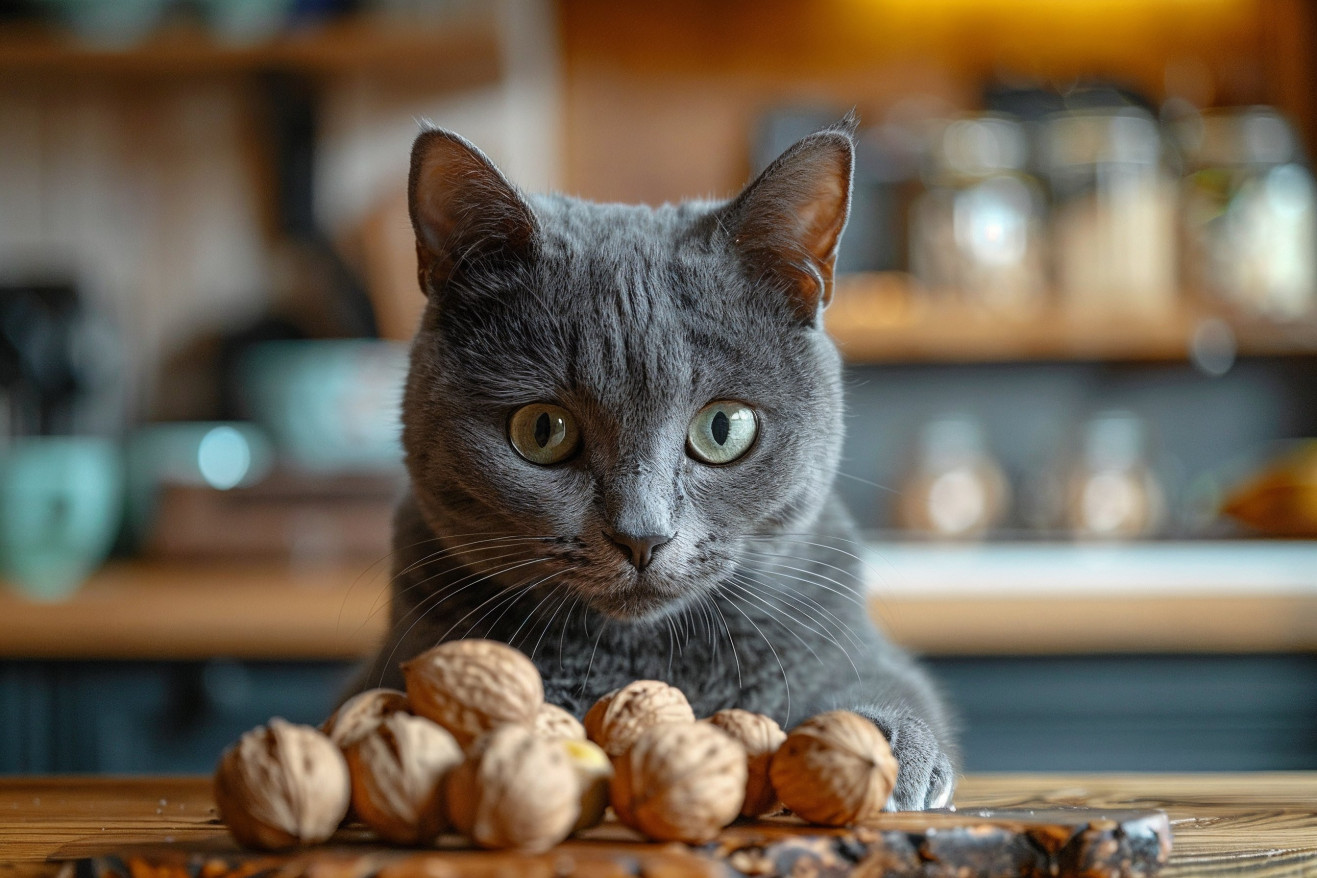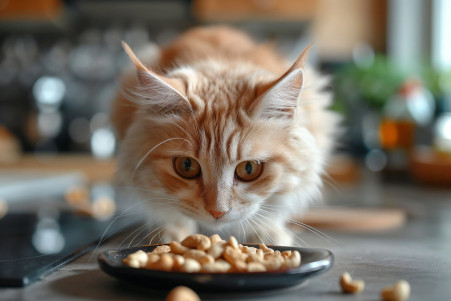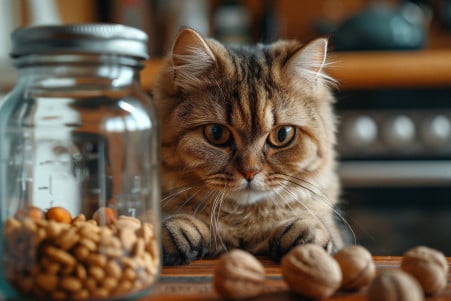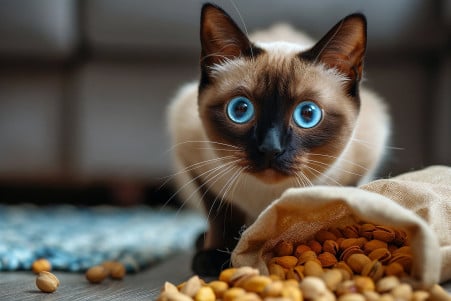Can Cats Eat Walnuts? Exploring Feline Dietary Restrictions
13 March 2024 • Updated 12 March 2024

Since cats are obligate carnivores, their dietary requirements are pretty specific, and that makes us wonder if walnuts are an okay option. The answer is no, cats can’t eat walnuts. Cats can have tummy troubles from eating walnuts because they are high in fat. Furthermore, mycotoxin-contaminated nuts can be toxic to cats. So, always make sure that your cat can’t get to any walnuts.
This article will delve into a number of scientific and veterinary studies that will help explain the dietary restrictions and potential health dangers for cats, especially in terms of walnuts and other similar items. We will look at nutritional analyses, toxicological investigations, and metabolic experiments to show why certain human foods that are good for us can’t be fed to our cats.
This information will not only give you a better idea of what cats can and can’t eat, but it will also help you make sure that your cat stays safe and healthy.
Can cats eat walnuts?
Why Cat Diets Can’t Be Vegan: It’s Not Just About the Meat
As outlined by DVM360, cats are not just carnivores, they are obligate carnivores, which means they have developed anatomical and physiological adaptations that make them dependent on a diet that is high in animal protein. For example, their sharp carnassial teeth are used to deliver a killing bite to their prey, and their short gastrointestinal tract is designed to digest meat, not the complex carbohydrates and fats in plant-based foods like walnuts.
Cats need to be provided with the nutrients they need to be healthy, including high-quality proteins for energy and tissue repair, taurine for cardiovascular and visual health, and pre-formed vitamin A, which they can’t get from plant-based sources like beta-carotene.
In addition, the Cornell University College of Veterinary Medicine points out that cats need these essential nutrients in the right ratios to maintain their health, a balance that can’t be achieved by feeding them walnuts.
In addition, as noted in a PMC article, “Cats and Carbohydrates: The Carnivore Fantasy?”, cats have a limited ability to digest carbohydrates and almost no ability to digest foods that are high in simple sugars. Their metabolism isn’t designed to handle the high carbohydrate and fat content of nuts like walnuts, which can lead to digestive and metabolic problems in cats.
Mycotoxin Risks in Cat Food
Mycotoxins are toxic compounds produced by certain molds that can grow on nuts, including walnuts, when they are stored in warm, humid conditions. According to ScienceDirect, these compounds can be highly toxic to both humans and animals, leading to a variety of diseases. Cats that consume foods that are contaminated with mycotoxins can suffer from mycotoxicosis, which can cause symptoms like vomiting, diarrhea, and in more severe cases, liver failure.
The economic and health consequences of mycotoxin contamination are significant. ScienceDirect explains that in the pet food industry, mycotoxins can lead to high veterinary costs and emotional hardship for pet owners whose pets become sick. The risk isn’t just to individual pets but also to the market as a whole, as millions of households have pets.
To protect cats from the risks of mycotoxins, it’s important to make sure that nuts, including walnuts, are stored properly and kept out of pet food. A study published in PMC explains that it’s important to regularly test commercial pet foods for mycotoxin contamination to make sure that animal feed is safe. By learning about the risks of mycotoxins, we can make sure we’re doing everything we can to protect our furry friends.
What Do Vets Say About Cats and Walnuts?
Vets are in agreement that cats should not be eating walnuts. Dr. Lorna Whittemore, who wrote a response to Hepper’s article, notes that the high-fat content in walnuts can cause gastrointestinal upset in cats, especially if they are eating them over an extended period.
In addition, the salt in salted walnuts can lead to salt toxicity. An article by Forest Vets explains that even a small amount of salt can be highly toxic to cats and requires immediate veterinary attention.
When it comes to giving your cat treats, vets recommend sticking to options that are safe for cats. An article by Preventive Vet lists safe treats as cooked, unsalted lean meats and small amounts of commercial cat treats. These options eliminate the risks associated with walnuts and also meet a cat’s nutritional requirements.
With these dietary guidelines and potential dangers in mind, it’s clear that walnuts and other tree nuts should be off-limits to cats to ensure their safety and health.
Understanding Feline Metabolism: The Problem with Human Foods
Cats have a number of metabolic pathways that are different from those of humans, and this has a big impact on their nutritional needs and their ability to digest certain foods, like walnuts.
Cats can’t synthesize several essential amino acids and other nutrients like humans can, and these must be provided in their diet, especially in the form of animal protein.
A study by Thompson et al. in BMC Veterinary Research in 2023 found that cats have a limited ability to digest carbohydrates and an even more limited ability to digest high levels of dietary fat, in contrast to humans, who have an omnivorous metabolism that can digest a variety of foods, including plant-based fats like those found in nuts.
These differences are further highlighted by a study in the Journal of Animal Science and Biotechnology in 2022, which found that cats require more protein and certain amino acids in their diet than dogs and humans due to their unique metabolic pathways, which have evolved to best use the proteins and fats found in animal, not the carbohydrates and fats found in nuts like walnuts.
Research by Patel and Singh in PLOS ONE, which looked at different cat breeds, also shows that cats have different susceptibilities to diabetes mellitus, the equivalent of type 2 diabetes in humans, suggesting that cats are not just small versions of humans when it comes to metabolism but have their own complex biological requirements that can be disrupted by foods that are safe for humans.
As a result, foods that are safe and healthy for humans, like walnuts, can be harmful to cats due to their inability to effectively metabolize these dietary components.
Pet owners need to be aware of these differences when choosing foods for their cats to make sure their diets are appropriate for their species and to avoid health problems.
How to Deal With Food Allergies in Cats
If your cat is experiencing food allergies, it’s important to first differentiate between food allergies and food intolerances. A food allergy in cats is an immune reaction to a protein in their diet, which can cause skin issues and itching, while food intolerance is a non-immune reaction that usually results in digestive problems. A study published in BMC Veterinary Research showed that the most common food allergens for cats are beef, fish, and chicken.
While nuts like walnuts are not commonly listed as allergens, they could still cause an allergic reaction in cats. A study by Jacqueline Bryan and Linda A. Frank listed the symptoms of food allergies in cats, which can include skin issues like miliary dermatitis and alopecia, as well as digestive symptoms like vomiting and diarrhea.
The Cornell Feline Health Center explains that diagnosing food allergies in cats will require an elimination diet and then a food challenge to figure out which food is causing the allergic reaction.
If your cat has food allergies, it’s important to make sure they are not exposed to the allergen. If your cat is allergic to walnuts, this means making sure that they are not in your cat’s food or environment.
Cat owners will need to be careful about what their cats eat, making sure to avoid any known allergens and watching for any signs of an allergic reaction. This will help ensure that your cat stays healthy and happy.
Conclusion: Cats and Walnuts
As we’ve discussed in this article, walnuts are not a good choice for cats. Cats are obligate carnivores and have specific dietary needs that walnuts cannot fulfill. In addition to not being able to provide the nutrition that cats need, walnuts can also cause a number of problems, from digestive upset due to their high fat content to the potential for mycotoxin contamination.
Most veterinarians would say that walnuts, and most other tree nuts, are not a good fit for a cat’s diet and that even a small amount could cause problems.
Pet parents have a responsibility to make sure that their cats are eating a safe and nutritionally complete diet, and part of that responsibility is making sure that cats don’t have access to potentially dangerous foods like walnuts.
Responsible pet ownership means more than just providing love and companionship, it also means understanding the biological and nutritional needs of the animals in our care. By making sure that we are making the best nutritional choices for our pets, we can help ensure that they stay healthy and happy and live long lives as part of our families.


